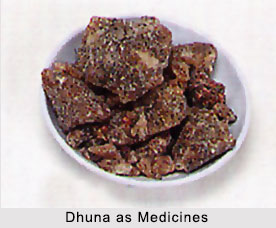 The resin of Shorea Robusta, called "Rala" in Sanskrit and "Dhuna" or "ral", in the vernacular, is regarded as astringent and detergent and is used in dysentery, and for fumigations, plasters, etc. The resin thrown over the fire gives out thick volumes of fragrant smoke and is much used for fumigating rooms occupied by the sick. It is also a common practice with natives to burn some ral in their rooms every evening, about the time that chirags or lamps are lighted, as also during the worship of idols.
The resin of Shorea Robusta, called "Rala" in Sanskrit and "Dhuna" or "ral", in the vernacular, is regarded as astringent and detergent and is used in dysentery, and for fumigations, plasters, etc. The resin thrown over the fire gives out thick volumes of fragrant smoke and is much used for fumigating rooms occupied by the sick. It is also a common practice with natives to burn some ral in their rooms every evening, about the time that chirags or lamps are lighted, as also during the worship of idols.
Health Benefits of Dhuna
Shorea Robusta, an important traditional Indian medicinal plant used in various ailments and rituals and the indigenous use of the resin of this plant as a medicament for treatment of various inflammatory conditions is well documented in literature.
Dose of Dhuna in Medicine
In the dysentery of children ral is recommended to be given in doses of about 20 grains, with an equal quantity of sugar or treacle.
Ral enters into the composition of some plasters and ointments. The following is an illustration; take ral, rock salt, treacle, wax, honey, bdellium, red ochre and clarified butter in equal parts, boil them together and prepare an ointment.
This article is a stub. You can enrich by adding more information to it. Send your Write Up to content@indianetzone.com
Related Articles
Ayurveda
Ayurveda Medication
Elements of Ayurveda
Concepts of Ayurveda
Ancient Literature of Ayurveda
Sushruta Samhita




















